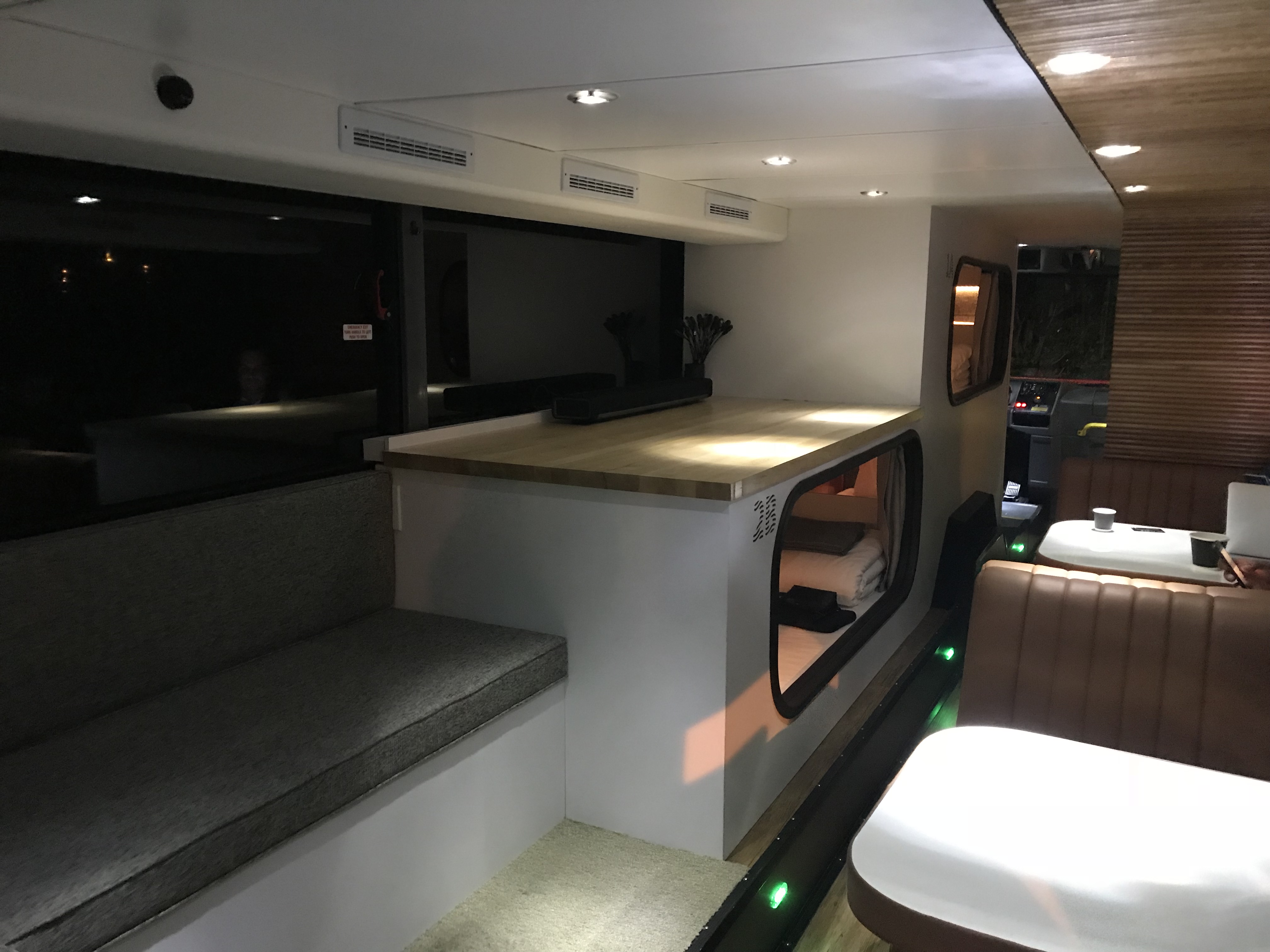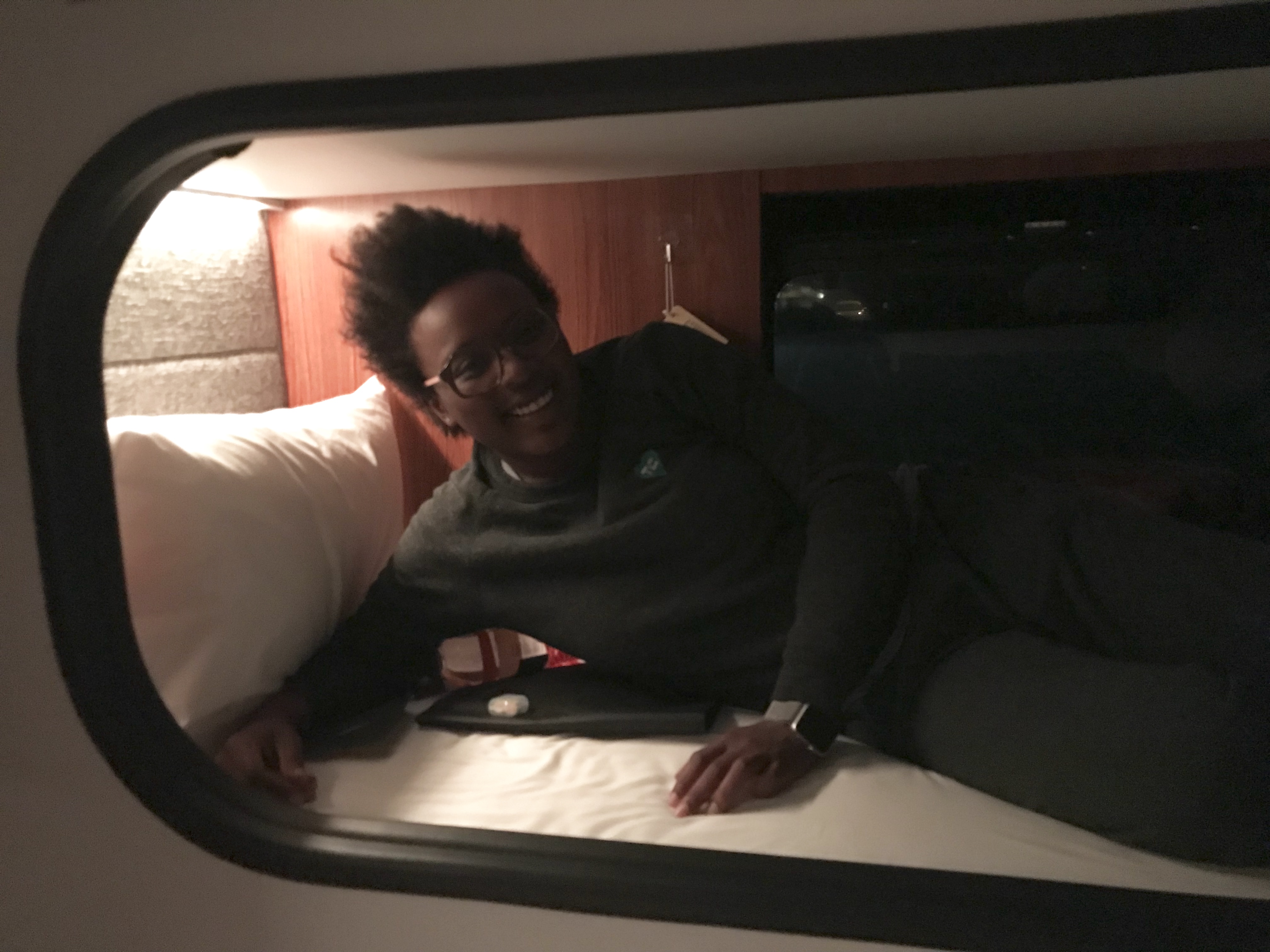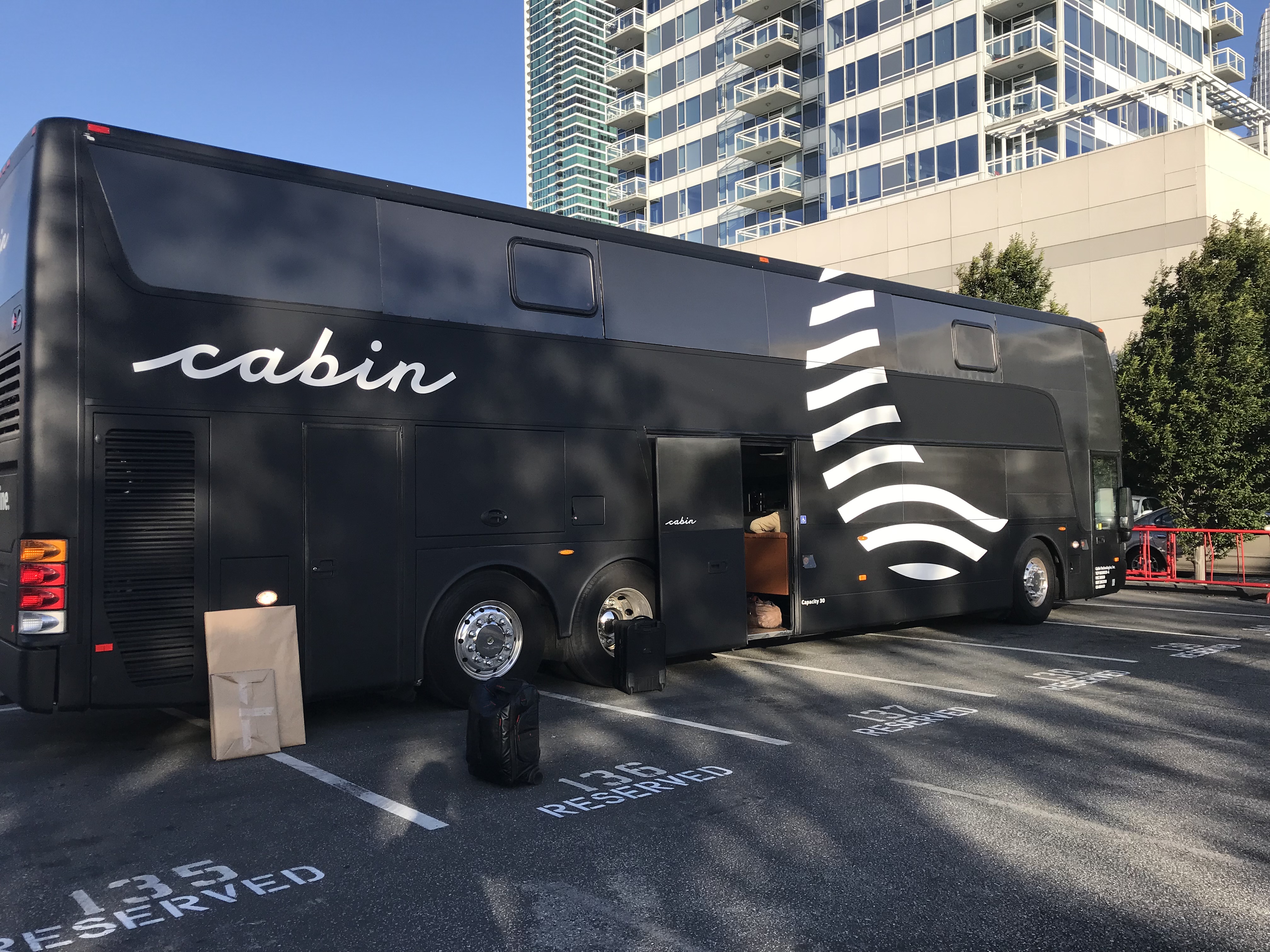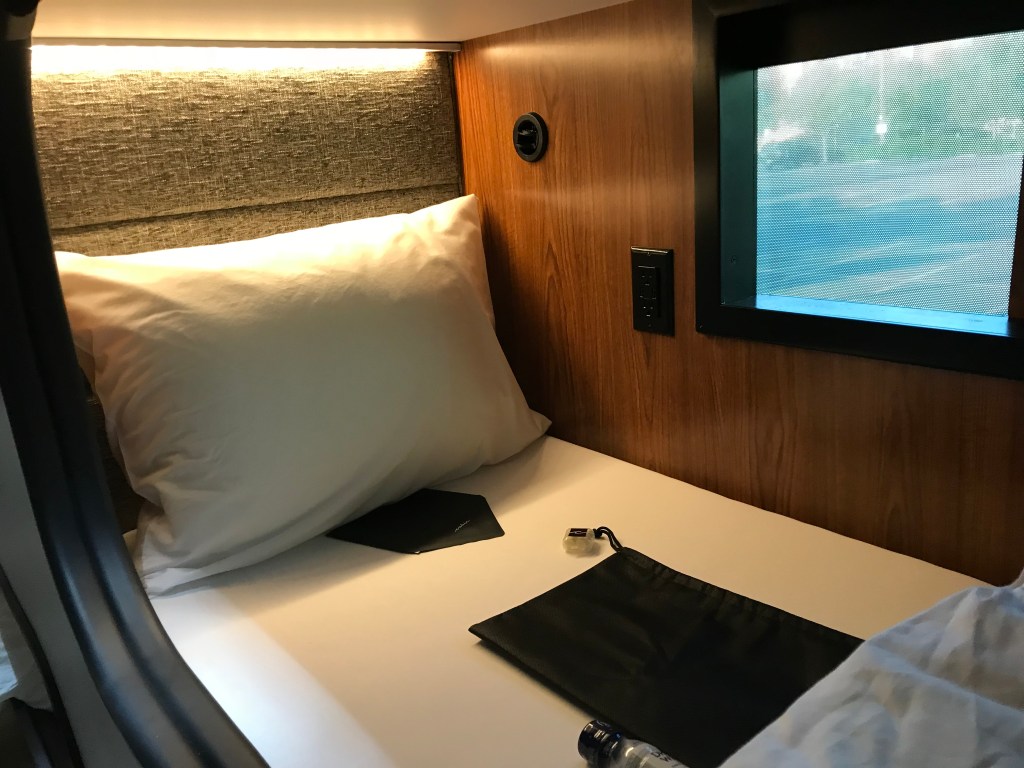Cabin, the sleep pod-equipped charter bus, wants to be like the Ritz Carlton, but on wheels.
Last weekend, I traveled from San Francisco to Los Angeles roundtrip on Cabin. When I arrived to the bus pickup location in San Francisco, a smiley attendant greeted me. She then proceeded to check me in and stow away my bag. Upon entering the bus, I saw the social lounge, where people can chit chat and hang out if they don’t want to go to sleep right away.
I bypassed that area and went straight upstairs to pick out my pod. I went with a top bunk with the emergency exit, because the exit row pods have the most room. Each pod was equipped with some nighttime necessities, like ear plugs, water and a melatonin supplement. Shortly after picking out my pod, a fellow traveler asked me if I wanted a picture of myself in the pod. Clearly, I said yes.

We left San Francisco at 11 p.m. on Friday, so I didn’t have to miss any work and we arrived at 7 a.m. in Santa Monica, which meant I had a full Saturday to spend in LA. The bus left LA at 11 p.m. on Sunday and arrived at 7 a.m. in San Francisco.
A round trip Cabin between Los Angeles and San Francisco costs $230. What you get with Cabin is a sleep pod, bedding, free Wi-Fi, complimentary water, nighttime tea, coffee, earplugs and a melatonin supplement. You can store up to two pieces of luggage under the bus and carry on one small item that can fit inside your pod.
Cabin is by no means the cheapest way to travel between San Francisco and Los Angeles. There’s Bolt and MegaBus, which both offer pretty cheap roundtrip tickets for about $50. There’s also, of course, flying, which is the fastest and, depending on how far ahead in advance you buy your tickets, not too expensive.
“We are really upfront that this is not the cheapest way to get to LA,” Cabin Co-founder and President Gaetano Crupi, who was riding on the maiden voyage, told me.
But Cabin is by far the most comfortable way. This is coming from someone who has made the trek between those two cities over 50 times. But although the sleep pod itself is pretty comfortable, the bumps on the road are not. It took me a little while to fall asleep on the way to LA, but I’m not sure if that was because I took a nap earlier that day or because of the bumpy roads. I had one of those experiences where I “woke up” in the morning and wasn’t sure I had ever even fallen asleep.
The way back was much better for me. I fell asleep pretty quickly and slept through the night. I even had a dream on the sleep bus about being on the sleep bus. So meta. Upon waking up, I went downstairs to the social lounge, where the Cabin attendant greeted me and offered me some espresso. After I finished my cup, I was on my way.
From SleepBus to Cabin
Cabin got its start as SleepBus, which offered roundtrips between LA and SF on a sleeper van. The entire pilot sold out, with over 4,000 attempted reservations, Crupi said. After raising some money, Crupi and co-founder Tom Currier started thinking about what nerve they struck.
“It’s not as simple as people want to sleep on a bus,” Crupi said, laughing. “That’s not it. That’s not the product.”
So they spoke with some of their customers and came to the conclusion that it all came down to time. But they didn’t want to simply offer a bus you could sleep on — something that felt like a hostel.
“That’s when the real insight came,” Crupi said. “Everyone is working on autonomous. It’s going to be commoditized. As soon as you start going into a two-hour period of time in a car and you don’t have to care about the driving portion and steering wheel, then why is it designed the way it is?”
Cabin wants to be a brand that “feels like the Ritz Carlton,” Crupi said. He went on to talk about how regional transportation in the U.S. is not ideal. To be exact, he said it “really sucks.” With autonomous vehicles, Crupi envisions a lot of regional transportation happening on the highways.
“What we think is, a future is highway trains,” Crupi said. “Once you start thinking about, ‘I have a customer for seven hours,’ then it’s about design and service.”
That’s where the emphasis on details to things like attendants, private spaces and amenities come in. Eventually, Cabin wants to add onboard ordering of coffee, tea and other things.
“You’re having the experience of autonomous, today,” Crupi said.
Self-driving, autonomous vehicles have been on the minds of Crupi and Currier since the beginning. One day, Cabin will not only offer the experience of autonomous, but truly autonomous travel.
“We’re pretty passionate about what autonomous would do to how people live,” Crupi said. “We think that once people aren’t worried as much about their commute, communities can be further apart and children can grow up in nature and all kinds of good things are going to happen, in terms of how cities are constructed and how people think about accessing where they work and where they live.”
Even though autonomous is still a ways away, Crupi and Currier wanted to bring an autonomous experience to people right now. That’s because they’ve been “excited about the idea of falling asleep in your car and your car taking you somewhere,” Crupi said.
Operating a hotel on wheels

So far, Cabin has built out three busses in order to offer nightly service — one bus going in each direction along with a backup bus. From now until September 1, Cabin is going to slowly ramp up the number of trips it offers.
As I mentioned, the trip I went on was Cabin’s first ever. This weekend, Cabin is making its second roundtrip voyage. Cabin’s taking it slow in order to work out the operations, like the best way to handle the laundry, trash and bathroom every day.
“You kind of have to make partnerships because it’s completely mobile,” Crupi said. “Laundry gets picked up and dropped off. The fuel comes to the vehicle. That’s one of the major benefits of this type of regional transportation solution, is that I don’t need an airport.”
When Cabin isn’t operating, it parks in a lot. When it picks up people, Cabin utilizes tour bus pickup zones. Cabin is fully legal in both San Francisco and Santa Monica.
“A lot of startups are like, ‘deal with the regulators later,’” Crupi said. “We were like we have an asset that can be impounded by the police department, so we got our route approved by the city engineer in Santa Monica. Everything is completely approved.”
For the next quarter, Cabin is going to focus on the hospitality element of the experience, Crupi said. It’s also going to continue to think about things like if the cabins are big enough or if they could look slightly different.
Regarding additional routes, Cabin is looking at Portland and Las Vegas. But one of the things that really interests Crupi is the middle of the U.S., which he says “is a massive opportunity.”
“I’m really excited about the fact that if you use the highway system and don’t need tracks, we can build this premium, almost European travel experience in the United States with very limited infrastructure,” he said.
Cabin recently raised $3.3 million for its moving hotel business. That’s what will allow the startup to expand its services regionally. Crupi recognizes that Cabin is not the type of startup that’s going to receive hundreds of millions of dollars in funding right now, but for now, Crupi said, “we have a profitable business model with customers we can learn from.”
Frequently asked questions
- Were you able to sleep?
On the way there, I think so. On the way back, yes. - Does the pod lock?
No, but I felt safe. - Were people raging?
Thankfully, no. I was surprised that everyone went night night pretty quickly and there wasn’t any noise. But if people aren’t ready to go to sleep right away, they can hang in the social lounge - Was the bathroom gross?
Nope! It was good for a bus bathroom. They even had tampons!! - Isn’t it cheaper to fly?
Depends on when you buy your flight, but yes, flying can definitely be cheaper. - Would you do it again?
 Generally when I travel, I experience a fair amount of anxiety. Flying means I have to get to the airport at least an hour early, and deal with security lines and potential delays due to weather or some other nonsense (think SFO’s runway construction). Driving means I have to be awake in the car for several hours and even if I’m a passenger, I can’t fully stretch out my legs. With Cabin, I can board up to 10 minutes before the bus departs and pass out on a real, albeit small, bed.
Generally when I travel, I experience a fair amount of anxiety. Flying means I have to get to the airport at least an hour early, and deal with security lines and potential delays due to weather or some other nonsense (think SFO’s runway construction). Driving means I have to be awake in the car for several hours and even if I’m a passenger, I can’t fully stretch out my legs. With Cabin, I can board up to 10 minutes before the bus departs and pass out on a real, albeit small, bed.









































Comment